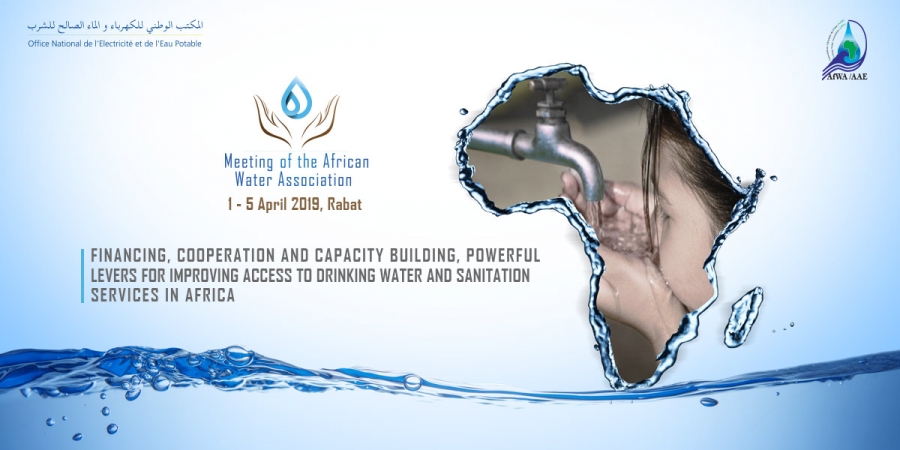"Financing, Cooperation and Capacity Building, Powerful Levers to Improve Access to Drinking Water and Sanitation Services in Africa". This is the theme that guided the 81st meetings of AfWA Scientific and Technical Council, held from 1st to 5th April 2019 in Rabat, Morocco, under the auspices of the Office National de l'Electricité et de l'Eau Potable.
At the opening ceremony, the Managing Director of ONEE, President of AfWA, Mr. Abderrahim El Hafidi, presented the alarming situation of access to drinking water and sanitation in the world, pointing out that 2.1 billion people, representing 30% of the world population, still lack access to domestic drinking water supply services and that 4.5 billion, representing 60%, lack safe managed sanitation services. Regarding Africa, he said that half of the people who drink water from unsafe sources live on the continent. He also pointed out that the coverage of safely managed drinking water services is only 24% in sub-Saharan Africa, and the access rate to sanitation services is 28%. Mr. El Hafidi then outlined ONEE's action strategy for drinking water and sanitation in Africa, mainly based on support and technical assistance for African water operators and the strengthening of their technical and managerial capacities to enable them to improve their performance for ensuring access to drinking water and sanitation to their users.
Morocco is a source of inspiration for the sector stakeholders, said Dr. Papa Samba Diop, President of the Scientific and Technical Council, in his speech. "There is so much to discover, so much experience to share to strengthen the capacities of the members of our Association which, for 40 years now, has been working to accelerate access to water and sanitation services for African populations". The STC President urged the 200 delegates attending the meeting to update themselves on technical and technological innovations to effectively address the needs of the population; he also asked them to focus on cooperation to reduce investment and operational financing needs.
The Minister of Energy, Mines and Sustainable Development of Morocco, Mr. Aziz Rabbah, for his part, pointed to the paradox of water management that is unequally accessible on the continent. He invited the main stakeholders to find the best technologies to manage water, which is abundant in some places and scarce in others, while ensuring its quality. Talking about the conflicts between some African states arising from the construction of dams that impacts access to water for other countries, the Minister said: "we need technological solutions to manage these political conflicts; how this resource shared by many African countries can, through appropriate technological solutions, serve everyone without prejudice to other countries?". He called on delegates: "We need your managerial intelligence to find right technological solutions to resolve these political conflicts". On the issue of financing, the Minister said that traditional financing schemes, namely borrowing and call for tenders are obsolete and delay the response to people's needs; he invited stakeholders to adopt innovative partnership solutions between public-private-financial institutions that will enable a rapid response to the growing and urgent demand for access to water and sanitation.
According to Mr Mohcine Jazouli, Minister in charge of Financial Cooperation of Morocco, this demand "should continue to rise until 2050 by 20 to 30% more than the current level". Water stress directly threatens many areas in Africa; it is often due to the lack of infrastructure and many times the required facilities are expensive and cannot be handled by only one country, hence the need to "think about the development of new cooperation schemes to bring together all key actors, to pool countries' resources and initiatives to be able to meet this major challenge". In this sense, he called for "making sustainable and equitable access to water and sanitation a priority at the continental level".
Finally, Mr. Loïc Fauchon, President of the World Water Council, expressed his regret that water supply is lower than its demand, despite the stakeholders' constant efforts to make it available to all. Yet "Africa is a waterlogged planet", he added. He then pointed out the demographic growth as well as the increase of the living standards which "require increasing amount of water every day". Since the major responsibility of water operators is "to secure, treat, distribute and finally purify water", he suggested diversifying available resources as a solution to satisfy agricultural, industrial or domestic demand. Apart from pumping and transfer, Mr. Fauchon advocated for water desalination and water reuse, which represent " great sources of water for the future". Addressing the issue of dams, he acknowledged the negative feedback about their existence despite their absolute necessity. That is why he called on scientists and inventors to build new-generation dams that are more respectful of people, nature and ecosystems, which will not only make it possible to store water in a sustainable way but will also help to end local crises caused by the lack or low storage capacity.
It should be noted that the opening ceremony of AfWA 81st Scientific and Technical Council Meetings ended with the opening of the exhibition of hydraulic equipment service providers.

 English
English  Français
Français 
